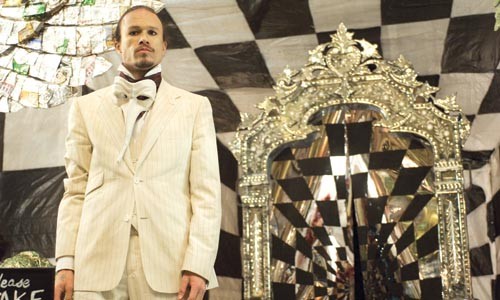The imagination is a wonderful and terrifying thing: You can use it to achieve things beyond your ability, or to confront fears you hope you'll never have to face for real. And then there's free will: behind door No. 1, the right choice; behind door No. 2 -- everything else. And is our will truly free at all, or were choices made for us long before we entered our frosty yellow wood?
To which I can only add: blah, blah, blah, blah, blah, blah, blah. I don't usually trade in banalities like those, and I don't much admire artists who do. This is especially true of the movies, a medium that offers its practitioners so many toys to play with at the expense of interesting ideas, which are a dime a dozen (i.e., that's what they pay the people who write them).
Terry Gilliam, the American of Monty Python, and its animator, has spent his years since the troupe's dissolution making elaborate phantasmagoria like Brazil, Twelve Monkeys, The Brothers Grimm and The Adventures of Baron Munchausen. Each had its pleasures, but none lived up to the vaunted reputation of its mad-genius creator. The closest Gilliam has come to directing a realistic tale about the exigencies of life is The Fisher King, and it's his least difficult film to swallow.
The Imaginarium of Doctor Parnassus is what we expect from Gilliam: an elaborate fantasy from an eccentric filmmaker, and not without some amusement. The actors are wonderfully game, the production is beautifully designed, and the themes are mercifully secondary, at least until the end, when Gilliam goes for broke rather than for smarts.
His titular doctor, portrayed by the invaluable Christopher Plummer, is actually an immortal guru, roughly 1,000 years old when we meet him, who long ago lived on a mystical mountaintop, reciting the story of life to and with his followers. If they stop telling it, he believes, then everyone and everything vanishes. Enter the Devil (Tom Waits, in an icily mellifluous performance), who seals the lips of the doctor's followers so that they can't tell the story -- and, somehow, life goes on.
So Parnassus makes a deal with his counterpart, although we don't learn what it is until much later. Most of the story takes place in contemporary London, where the Doctor runs a traveling sideshow, working with his soon-to-be-sweet-16 daughter Valentina (Lily Cole); a young man named Anton (Andrew Garfield), whom they saved from the streets; and a quasi-snarky "midget" (Vern Troyer) who knows the Doctor's mind almost better than the Doctor does.
On the surface, they entertain with flamboyance and magic, but if they permit you to pass through a mirrored curtain at the back of their truck, you enter the Imaginarium, a vivid fantasy world where the Doctor offers you a chance to save your soul by choosing enlightenment or self-destruction. (Guess what choice most people make?)
Then, one ominous night, Valentina and Anton see a man hanging from a rope, and they save his pitiful life. He's an amnesiac as first, but soon they learn he's named Tony (Heath Ledger, outstanding in his final role), and he has a secretive and not-so-honest past. Just how dishonest is he? Can his soul be saved? Or will the Devil get there first?
I'm not sure what else to say about Doctor Parnassus, except that I enjoyed it until the last half hour, when Gilliam's thin conceit becomes dizzyingly elaborate and excruciatingly banal. When a drunken lout enters the Imaginarium, he stumbles through broken booze bottles. When a well-to-do dowager enters, she sees giant designer shoes. A kid revels in a world of sweets, but he doesn't get to face a crossroads: "Choice is not available without parental consent." (Hmmm. Parnassus must be a Republican.) Through all of this, Gilliam's characters keep reminding us about the social and psychological value of storytelling, just in case we start to wonder why he concocted this special-effects extravaganza (with touches of Pythonesque animation, and a kick line of policemen in skirts).
Ledger didn't live to complete his role in Doctor Parnassus, so Gilliam hired three actors -- Johnny Depp, Jude Law and Colin Farrell -- to play Tony in the scenes inside the Imaginarium. This casting switch makes a certain bit of sense, splintering Tony's persona as he confronts his Demon; it also salvages an expensive movie.
There's a story out there that Ledger ad-libbed the line "don't shoot the messenger" in one of the fantasy scenes he lived to film, and when Depp re-did the scene, he ad-libbed the same line, without knowing Ledger had done it. You can play creepy "woooo-hooooo" music here if you like, or you can simply conclude that clichés are clichés for a reason. It's your choice.















